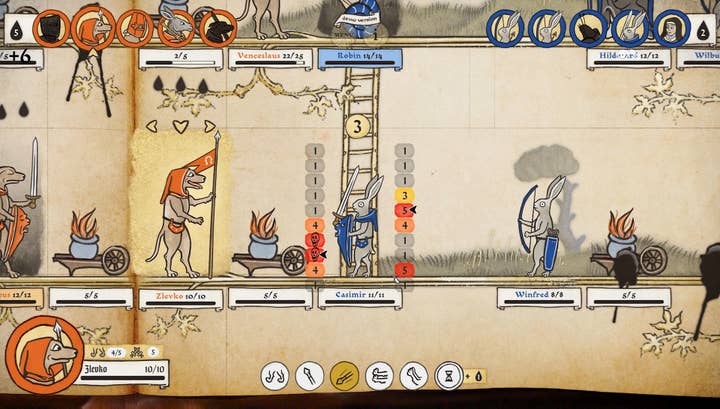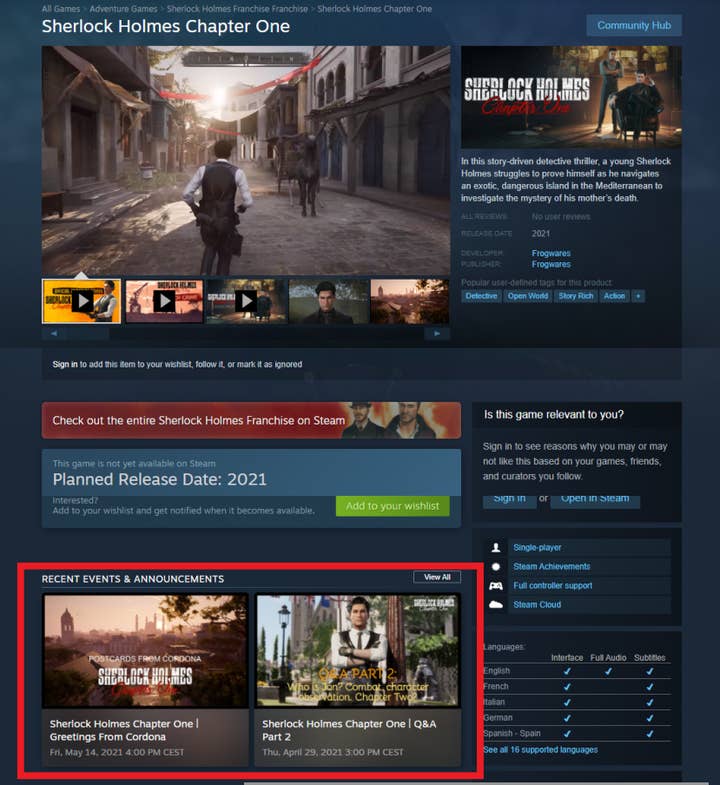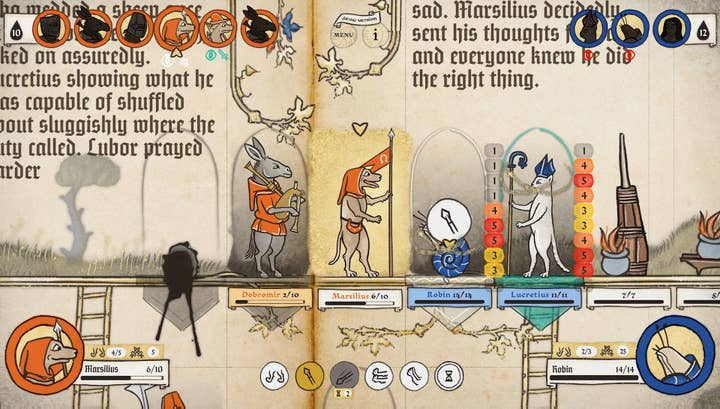Perceptions matter: Small things to make your game's marketing stand out
Marketing specialist Michal Napora on how subtle changes in word choice and language make you more memorable
Do you sometimes look at a person that you've just met and think to yourself "I don't know what it is about them, but I like them"?
It could be anything -- the way they talk, act, move, look like, eat, smell, dress, comb their hair, paint their nails, wear their shirt, pronounce words, smile. It's not something quantifiable, something that you can assign a number to. It's a deep-seeded, subconscious-level feeling. That first meeting, you either like them or you don't. And in those three or four seconds, you make a decision. You either go further and see who they are or you let them be and most likely never come back to them.
People make that same judgment about your game and your studio. The way you appear to them will be reflected in their attitude towards you. In other words, impressions form perceptions.
That first meeting with someone new, you either like them or you don't... People make that same judgment about your game and your studio
Do you want your game to be perceived in a more positive way in those first few seconds? You do? In that case, follow me and I'll show you a few marketing tips to make your game be perceived in a better light. For the next few minutes, I'll be your stylist, your wordsmith, your personal trainer, tailor, and psychologist too. Food and wine? Well, that's something that you'll have to arrange for yourself.
These following tips are my pieces of wisdom, pet peeves, and gear-grinders that I've collected over the years. Am I right, or am I wrong? Well, that's up to you to decide. But hopefully they will stir those brain cells of yours and get ideas percolating.
Do not say your game is "beautiful"
Never ever refer to your game as "beautiful." Let others come to that conclusion. When describing your game, avoid this word like the plague.
Think about it this way: if you were flicking through Tinder, and a person described themselves as "beautiful," no matter their looks, what would you think about them? You probably would think they're vain, perhaps a bit up themselves, and you might even think to yourself: "You know what, you're not that good-looking, I've seen better." So why would your game be any different? Why shouldn't players feel that same way about your "beautiful" game too?

Your graphics can be "hand-drawn," "futuristic," "cel-shaded," "Dali-inspired," "oil-paint-like." Your game world can be "gritty," "dark," "beaming with sunshine," "a place where optimism shines no matter how dark the world around you is." But don't say the game, the world or the graphics are "beautiful."
Let people come to that conclusion themselves looking at the screens and/or gameplay. It means so much more to judge something as beautiful by yourself as opposed by being told it is the object itself.
Other words to avoid include "fun." I hope your game is fun, whatever the definition of fun might be. I mean, why else would I be buying a game for? Same goes with "unique" -- because your game is the only game in the world in its own category, unlike all the other games out there who are all the same... You'll be taken more seriously without these words in your copy and vocabulary.
People relate to names, not descriptors
As soon as we know someone's name, we treat them differently. They become someone we know. A stranger you can ignore, give them the cold shoulder. But as soon as you find out that the stranger's name is Jim, well, you can't ignore them easily anymore. You got to at least give Jim a nod, a wave, maybe even shake his hand. Maybe...
Same goes for your video game. In your Steam copy, interviews, socials, descriptions, news, anything that will reach player eye or ear, use names. Names of characters, heroes, towns, cities, the world, locations, shops, restaurants... People relate to names, not descriptors. "Welcome to Pinegrove" sounds more warm and familiar than "Welcome to our city." Anything that makes it personal drags you in. It's how we feel that we know someone a bit more.
Your game can be hand-drawn, futuristic, cel-shaded, Dali-inspired, oil-paint-like, gritty, dark, beaming with sunshine. But don't ever say it is 'beautiful.'
Bonus point: if you are working on a story-based game, where narrative takes center stage, this is critical. Your potential client base play narrative-driven games for a reason. Help them get lost in your world and narrative even before they play. They'll be more inclined to make that final step, purchase your game, and complete the story that you've been building.
Make the player the central character of the words that you use
When you describe what the player will do either in your copy or in your voice overs, make the player the central character.
Here's an example of how this works: "As a player, you will take on the role of a reincarnated ninja assassin who has the power to control the shadows." Not bad, but let's make you the hero. Now, read this: "You are a reincarnated ninja assassin who has the power to control the shadows."
Which sentence makes you feel "closer" to the product? Which one makes you feel more inside the game's world? Words can make the distance between the player and the game appear longer or shorter. Like objects in your rear-view mirror.
It's better when others speak about you
This might seem a bit obvious, but it's more believable when others speak about you as opposed to you speaking about how awesome you are. Now, I'm sure that the first thing that comes to your mind is "Okay, genius, so how do I get people to talk about me?" Well, that's a whole other series of articles and whatnots, but what I'll say is this: There are a lot of great partners out there who can mention your game. First parties, third parties, press, influencers, manufacturers, other studios, they could be more than happy to mention your work.
Keep in mind though that not every mention is the same. One of my old-time favourite saying is Marshal McLuhan's famous "The medium is the message" line. Not all messages, or ways those messages are reached, are equal. You showing an ad on Facebook about yourself does not have the same weight as someone else talking positively about you. So reach out to as many partners as you can. It all helps in building positive perceptions about your product.

Get good copy full of soundbites
I've heard that many players do not read your Steam description. And you know what, this might be true. But you know who does read your Steam pages and press kits? Press, YouTubers, and streamers do. And this is where catchy, bite-size catch-phrases come into play.
Let's bust an example. Same game (Inkulinati), different pitch lines. Which one is better?
Inkulinati is a turn-based strategy set on pages of medieval manuscripts in which unique creatures battle for victory. Set in a fun and beautiful world, you will fight by drawing various creatures to become the ultimate champion.
Or
Inkulinati is an ink-based strategy straight from medieval manuscripts, where a rabbit's bum can be deadlier than a dog's sword. Become a master of the Living Ink, build your own bestiary, defeat medieval superstars and collect perks to unleash hidden powers.
Personally, number two is a winner. There are sooo many catchphrases in here worth repeating. Medieval superstars, ink-based, rabbit's bum vs dog's sword. In fact, they're so good that multiple YouTubers, journalists, and streamers have used them in their materials. So although gamers might not read your words, other media channels/outputs might. And the more catchy they are, the more memorable they will be for their audience. So, make your words sticky.
No updates means a dead project
I'll be honest with you. I love Steam. Not only as a store, but for being a social platform. I love keeping the Steam community engaged with my game's news that I post. The other benefit of posting regular news is that it makes your Steam Store page look active and nice looking. If you post news, a new "RECENT EVENTS & ANNOUNCEMENTS" category appears on the front of your Store page.

A regularly updated Steam Store sends a message that the game is coming along nicely, that the developer is communicative and responsive, and most importantly, that the project is not dead.
This is really important if you are in Early Access phase. Seeing an Early Access game with the last news piece posted a few months ago does not breed confidence. Keep your Steam news regular (there are sooo many topics that you can cover here, both before and after release). Not only will you look good, but thanks to Steam becoming more like a social network, you will reach more people too.
Bonus tip for any social media: If you cross-post via Hootsuite or FB manager, don't use Insta/Twitter hashtags on Facebook. It just screams copy and paste. #gamedev #businesstips #thisdoesn'tbelongheresoitlookswierd
I hope that some of these tips will help you out in making your game look better and building better perceptions of yourself. Because no matter what your free-spirited friends say, sometimes it's good to worry about what people will think of you. At least when you try to sell either yourself or your product.
Michal Napora is a video game marketer and owner of marketing agency 32-33. His gaming credits include Dying Light, The Sinking City, Aragami, Sherlock Holmes: The Devil's Daughter, and more. If you need help or advice on marketing, you can reach him on LinkedIn.
